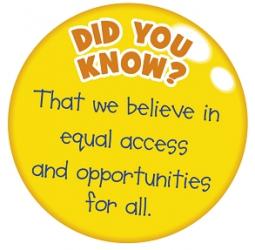
Your rights to equal access and the full enjoyment of the goods, services, facilities, privileges, advantages or accommodations of any place of public accommodations are protected by federal and state laws, and the City of Tampa's Human Rights Ordinance Chapter 12, Section 12-61 to 12-68. It is against the law to deny equal access to goods or services based upon a person's membership in one or more of the following characteristics known as "protected classes".
City of Tampa's Human Rights Ordinance (Tampa Code): Protected Classes
- Race
- Color
- Religion
- National Origin
- Sex
- Sexual Orientation
- Gender Identity or Expression
- Age
- Disability
- Marital Status
- Familial Status*
Florida Civil Rights Act (Chapter 760, Florida Statutes)
- Race
- Color
- National Origin
- Sex
- Disability
- Marital Status
- Familial Status*
- Religion
Title II, Civil Rights Act of 1964
- Race
- Color
- National Origin
- Religion
*Includes children under the age of 18 living with parents or legal guardians, pregnant women, and persons securing custody of children under the age of 18.
The places of public accommodations include, but are not limited to:
- Places or resorts of amusement
- Inns, hotels, motels, and other establishments which provide lodging to transient guests
- Restaurants, cafeterias, lunchrooms, lunch counters, buffets, and other facilities engaged in selling food or beverages.
- Retail establishments
- Gasoline stations.
- Theaters and motion picture houses.
- Skating rinks, amusement parks, bowling alleys, and golf courses
- Concert halls, gymnasiums, sports arenas, stadiums, and other places of exhibition, recreation, or entertainment
- Library or educational facilities supported in part or whole by public funds
- Public conveyances, including taxis, limousines, and buses.
- Barber and beauty shops.
- Hospitals.
- Laundries.
- Swimming pools.
- Nurseries, kindergartens, and day-care centers
- All establishments holding a license for the sale of alcoholic beverages issued by the Division of Alcoholic Beverages and Tobacco, Department of Business Regulation of the State of Florida.
NOTE: Such term shall not include any establishment, club, or place of accommodation which is by its nature a private membership organization that is not open to the public.
The places of public accommodations include, but are not limited to:
Related Unlawful Practices in Public Accommodations:
It is unlawful for someone to take any of the following actions against an individual because of their race, color, religion, national origin, sex, sexual orientation, gender identity or expression, age, disability, familial status, or marital status:
- Refuse, withhold from, deny or deprive, or attempt to withhold from, deny or deprive any person any of the goods, services, facilities, privileges, advantages, and accommodations of any place of public accommodations.
- Publish, circulate, issue, display, post, or mail any written or printed communication, notice or advertisement, to the effect that any of the goods, services, facilities, privileges, advantages and accommodations of any place of public accommodations shall be refused, withheld from, or denied to any person, or that the patronage of any such person is unwelcome, objectionable, or not acceptable, desired, or solicited.
- Segregate any person at a place of public accommodations, or to segregate any person in regards to the goods, services, facilities, privileges, advantages, and accommodations of any place of public accommodations.
- Intimidate, threaten, coerce or interfere, or attempt to intimidate, threaten, coerce or interfere with any person in the exercise or enjoyment of, or on account of such person having aided or encouraged any other person in the exercise or enjoyment of, any right granted or protected by law.
Additional Public Accommodations for Persons with Disabilities:
Disability means (with respect to a person)
- A physical or mental impairment which substantially limits one or more of such person's major life activities.
- A record of such a disability, or
- The person is regarded as having such a disability.
A reasonable accommodation request made by a disabled person may not be refused by a public accommodations entity when that accommodation would grant access and/or provide the services or activities provided.
Accommodations may include, among others:
- A change in rules, policies, practices, or services such as permitting service animals to accompany a disabled person into a restaurant.
- Structural change, such as constructing a ramp, or provide accessible parking spaces.
How can I file a discrimination complaint?
You may come to the City of Tampa Office of Human Rights where we will ask that you fill out an intake questionnaire identifying the nature and basis of your complaint. Based on the information you provide, the charge will be filed under the corresponding federal laws, or the City of Tampa Human Rights Ordinance (Tampa Code), if the jurisdictional requirements are met. There is no cost involved for this administrative process.
If you have any questions regarding your particular circumstances, or if you would like to make an appointment, you can call us at (813) 274-5835.
Our office is located at: 2555 E. Hanna Ave., Tampa, Florida 33610
Hours of operations are: Monday through Friday from 8 a.m. to 5 p.m.
How long do I have to file a discrimination complaint?
A discrimination complaint may be filed with the City of Tampa Office of Human Rights as soon as discrimination occurs, but no later than one hundred and eighty (180) days, or six months, from the date that the discriminatory event occurred.
Which human rights laws are enforced by the City of Tampa?
The City of Tampa enforces local, state and federal laws that prohibit discrimination in the areas of employment, public accommodation and housing.
